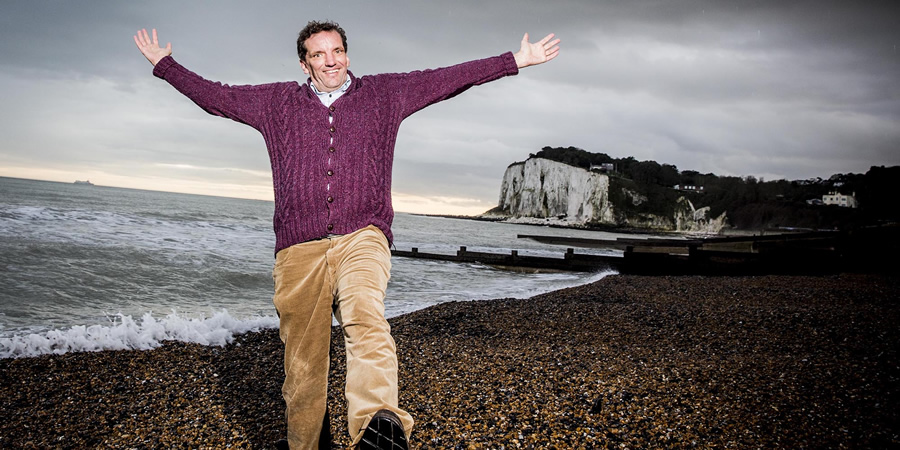Henning Wehn interview

An Immigrant's Guide To Britain is the series in which Henning Wehn and a gang of first-generation immigrants provide an irreverent guide to life in this country, through a mixture of reports, sketches and hidden camera experiments. Throughout proceedings, Henning provides his own wry thoughts on what it is to be British and, more importantly, what it is to move to this country as a foreigner. We're an odd lot, it would seem. Here, the man himself explains more...
What's the concept behind An Immigrant's Guide To Britain?
It's a three-part series. A programme for immigrants, by immigrants. It's explaining Britain - it's essentially like a Public Service Broadcast, aimed at people from abroad who are considering coming to the UK, and what they can expect. Of course, people originally from Britain are allowed to watch it too - they might even find it quite funny!
You've been in this country for 14 years. Is it true you initially came over to work for Wycombe Wanderers FC?
Yes, that's true. I was drawn to the idea of working for such a prestigious and internationally renowned club. The season before, they'd been to the FA Cup semi-final. I'd always worked in football in Germany, and the people I was working for in Germany were about to go under, so I looked at my CV. I thought it looked alright, but I didn't speak English, apart from basic school English. So I thought I'd go and spend a few months in England, and I applied to all the 92 league clubs. I had a few interviews in and around London, and ended up with a job at Wycombe.
Why did you decide to stay in the UK, having only originally come for a few months?
Everything just fell into place. I enjoyed it here, and I still enjoy it, for whatever reason. Wycombe was very good - the Chilterns is a brilliant part of the country. The weather was a lot better than I initially expected - I'd never been to London or anywhere in the UK before, and I believed all the stereotypes, that it would always be foggy and raining, and that all the food would be inedible. And none of it was true. And I enjoyed my time at Wycombe, then moved on to work for a football business magazine in London. And fairly early on I stumbled into stand-up, so I had that as a hobby. The whole package was so good that I never felt like I should move.
What were the things that were most difficult to get used to, as a UK immigrant?
I struggle with the attitude to debt. The idea that it's perfectly okay to be in massive debt. Even that term 'good debt' - I find it hilarious. From a German point of view, it sounds a bit like 'benign cancer' - it might be benign, but I'd still rather not have it. So I still find the British attitude to debt confusing. Other than that, I think I understand the country.

Do you think people in the UK are unwelcoming to immigrants, and was that your experience?
No, not in the slightest. I come from a very similar culture, so I've always felt at home here. Everyone likes football, everyone likes a pint, so I've always felt at home, really.
Does that include when England are playing Germany at football?
Well, that's always in the early stages of the tournament! But even that has changed. When you talk to German people who lived here back in 1996, during the Euros, German cars were being smashed up and all that. If England play Germany in the Euros in a few weeks' time, that's not going to happen again. Over the last 20 years, things have changed a lot. Being German is actually a viable business plan in this country. You have German Christmas markets. There are loads of German pubs now - there's a lot of German stuff going on - already a lot more than there was 15 years ago when I came over. So all of that has calmed down a lot. Even the war references - that's all just panto, isn't it?
In the UK, there seems to be this belief that we're the funniest nation in the world, and that the Germans have no sense of humour. What's the reality?
I think they all like a laugh - I think the difference is the social importance of humour. In the UK, someone writing their CV will put on it that they've got a good sense of humour, and companies look for staff who say they have a good sense of humour. And you think "How's that going to help you with your job?" And someone like Gordon Brown gets criticised for not being funny enough. He was the bloody Prime Minister - that's not what I judge him by. Germans would never judge Angela Merkel on whether or not she was funny. Is she reliable? Does she get the work done, and make good decisions?
In Britain it's "Does he like a pint and does he have a laugh? Does he crack a joke?" I'm not sure how that qualifies him to run the country. But that's just the slightly different attitude, and the emphasis based on humour in Britain as opposed to overseas.
Do you have any favourite parts of the programme?
I like everything that Mark Silcox was in. He's brilliant - a comedy genius. (Video clip)

Do you think it's true that British people are obsessed with the weather?
Well, the weather does change quite a lot, so that is something to talk about. That is a bit of a stereotype, that Brits are obsessed with the weather, but no more than the change of weather justifies, I would say. You need to talk about the weather so you know what to wear when you go out. I think it's a good conversation in this country, because the weather can be all sorts. If you live in the middle of Australia, you can't talk much about the weather, because it's not exactly the basis for a good conversation. Here it changes four or five times in a day.
What have you found to be the best and worst things about living in this country?
The best is the flexibility - you can do whatever you want. You can start any profession you like. You can work in any field. You can be a lawyer one day, a plumber the next, and vice versa. That, I think, is incredibly refreshing. The downside to that,is the quality of work is rarely very high. So that personal freedom comes at the expense of quality of work - it's unavoidable.
Lastly, do you feel that you finally understand British people, and has your opinion of the Brits changed in your time here?
I think I understand quite well how it works. Has my attitude changed? Not really. When I arrived, I didn't know at all what to expect, but then I was immediately made to feel at home at Wycombe. And I've never had any moment where I've been made to feel like an outsider, or that I don't belong here. I feel at home.
I wouldn't say my attitude has changed, because I didn't have an attitude towards British people. The British people are quite difficult to stereotype, because of the class divide. In the papers in Germany you'll see all the pictures of the Royal Family, and they think that's Britain, and everyone's wearing the correct jacket and goes foxhunting. But then the Brits you actually encounter on holiday in Spain are tattooed yobs chucking about plastic chairs. So there isn't really that one stereotype of the Brits. I've encountered both sets, lots of them, but it meant I didn't have any clearly defined expectations.
An Immigrant's Guide To Britain is on Channel 4 on Mondays at 10pm.

